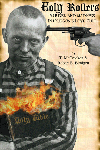Holy Rollers: Murder and Madness in Oregon's Love Cult
by T. McCracken and Robert B. Blodgett
CHAPTER FIFTEEN
I Got My Man
***
For God so loved the world, that he gave his only begotten Son, that whosoever believeth in him should not perish, but have everlasting life.
John 3:16
***
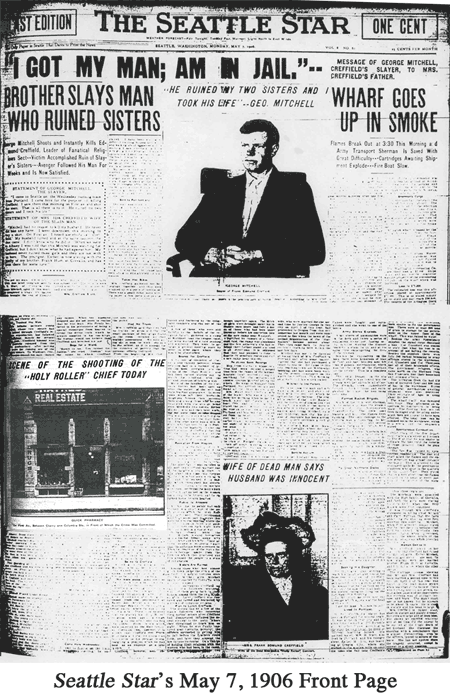 Maud yelled at George and
flailed her hands about, trying to strike him. She grabbed his arm to hold him
until help came but, seeing blood flowing freely from Creffield, let loose her
grasp. She knelt by the body, an arm under his neck and her face pressed
against his. For the longest while she stayed like that, kneeling in total
silence.
Maud yelled at George and
flailed her hands about, trying to strike him. She grabbed his arm to hold him
until help came but, seeing blood flowing freely from Creffield, let loose her
grasp. She knelt by the body, an arm under his neck and her face pressed
against his. For the longest while she stayed like that, kneeling in total
silence.
“He can’t die,” she finally whispered, “You cannot die, Joshua.” She looked up into the faces of those who had gathered round and said: “He can’t die. He can never die. He did no harm.”
Emil Bories, the first doctor to reach the scene, lifted Maud to her feet. Misunderstanding her, thinking she had said it was all a “josh,” he said: “Madam, this is no josh. This man is dead.” Within moments a transformation came over her. She became the Widow Creffield. All emotion drained from her, and her large deep blue eyes were now those of an automaton.
She discussed the shooting with a nonchalance that police officers found disconcerting. She refused to answer most of their questions, even refusing to divulge her or her husband’s real names. “I’ll tell anything I have to tell at the proper time,” she said to Detective Corbett. “But the man had absolutely nothing to shoot my husband for.”
George made no attempt to escape. When Officer Ernest Le Count and Deputy Sheriff Sam Huth arrived, they found him standing beside the body calmly smoking a cigar. He handed his revolver to Le Count, who then put him under arrest. He was taken to jail where--short of fluffing his pillow and giving him a key--officers showed him every courtesy. Many openly admitted that they thought the killing was justified and predicted that no jury would ever convict their new hero. He was allowed to talk to reporters in the visitor’s cell.
Sitting on a stool, George, a shy, twenty-three-year-old mill worker with sandy hair, freckles, and a boyish, innocent-looking face, twisted his big browned hands in a nervous clutch. He said he wasn’t used to the limelight, and this, not having just killed a man, was what was making him nervous.
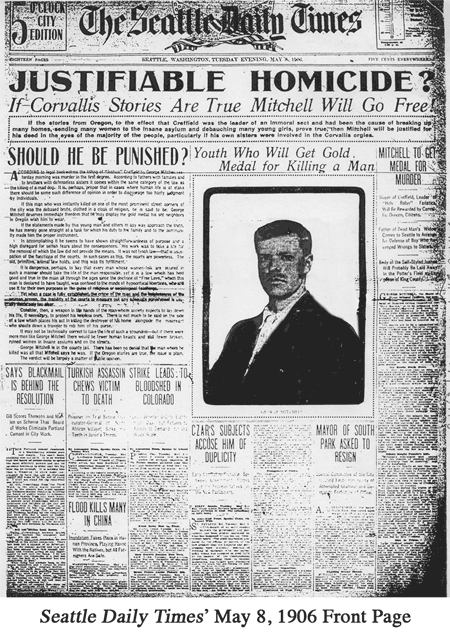 Well, I just shot the man for
ruining my two sisters [George said]. That’s all there is to it. . . .
Well, I just shot the man for
ruining my two sisters [George said]. That’s all there is to it. . . .
I am, of course, sorry that I have been called upon to take any man’s life, but there is no one among you who can appreciate my feelings. No brother could love his sisters any more than I. . . .
They were good Christian girls, until this man came along. . . . They believed in him and thought he was a godly man. I guess they believe in him yet. In spite of the fact that he has ruined them and disgraced the rest of us. I tried to make them see it like we and everybody else saw it, but it was no use as long as he was around. Well, he ain’t around now. . . .
It was willed that I meet him today and Creffield suffered the end that he was entitled to.
George asked that a telegram be sent to O. V. Hurt: “I’ve got my man. I am in jail here. George.”
“I feel that a less violent way of dealing with the man would have been a blessing,” O. V. said--as only O. V. would have. He was one of the few men whose daughter had made love to Creffield who wasn’t running around with a gun, ready to blow the Second Savior away, should their paths cross.
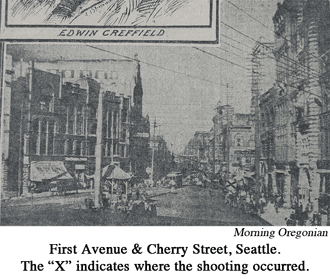 Still, O. V. said: “I will
spend the last dollar I have in the world to defend George Mitchell if
necessary.” He went to Seattle and hired Morris, Southard, and Shipley, one of
the best law firms in Washington. At the time, Will H. Morris was perhaps the
most renowned criminal lawyer in the state, with a record of eleven acquittals
in eleven first-degree murder cases--among them were two brothers who killed a
Seattle police chief, a wealthy Klondiker who shot his wife three times, and a
man who killed the seducer of his daughter on a public thoroughfare in Seattle.
Morris’s partner, Silas M. Shipley, was one of the most effective advocates in
the country.
Still, O. V. said: “I will
spend the last dollar I have in the world to defend George Mitchell if
necessary.” He went to Seattle and hired Morris, Southard, and Shipley, one of
the best law firms in Washington. At the time, Will H. Morris was perhaps the
most renowned criminal lawyer in the state, with a record of eleven acquittals
in eleven first-degree murder cases--among them were two brothers who killed a
Seattle police chief, a wealthy Klondiker who shot his wife three times, and a
man who killed the seducer of his daughter on a public thoroughfare in Seattle.
Morris’s partner, Silas M. Shipley, was one of the most effective advocates in
the country.
George had $2.50 to his name, not even enough to cover the expenses of a day for the likes of Morris, Southard, and Shipley. He didn’t need to worry, though. Besides O. V. Hurt, others in Corvallis rallied to his aid. Notices “For the defense of Mitchell” were posted all over town:
Everyone should assist and double the donations already made, for this case is not of the ordinary, and that young Mitchell was justified in committing the deed seems to be the general opinion of everyone familiar with the unholy teachings and practices of the slain Creffield. Everyone can donate at least a small amount towards the Mitchell fund and this should be done within the next few days, as the time is limited. Donations can be left at the Gazette office, or handed to Roy Raber, on the street.
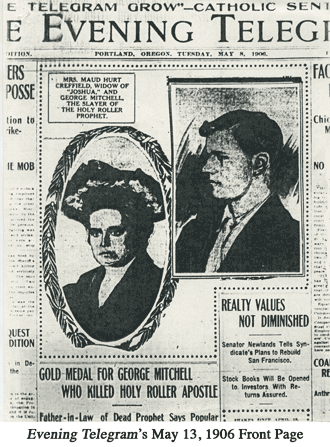 None of this would have been
necessary if George--or, as some now referred to him, young Mitchell--were to
have been tried by the press instead of by a court of law.
None of this would have been
necessary if George--or, as some now referred to him, young Mitchell--were to
have been tried by the press instead of by a court of law.
According to legal bookworms [the Seattle Daily Times reported], the killing of “Joshua” Creffield by George Mitchell yesterday morning was murder in the first-degree. According to fathers with families and to brothers with defenseless sisters it comes within the same category of the law as the killing of a mad dog. It is, perhaps, proper that in cases where human life is at stake there should be some such difference of opinion in order to discourage too hasty judgment by individuals.
His work was to take a life for the removal of which the law did not provide the means. It was not lynch law--this is usurpation of the functions of the courts. In such cases as this, the courts are powerless. The old, primitive, animal law holds, and this was its fulfillment.
It may not be technically correct to take the life of such a scoundrel--but if there were more men like George Mitchell there would be fewer human beasts and still fewer broken, ruined women in insane asylums and on the streets. The verdict will be largely a matter of public opinion.
Morris and Shipley soon began receiving telegrams and letters from all over the country offering assistance. “The reasons which actuate these proffers are of course understood by all,” Morris said.
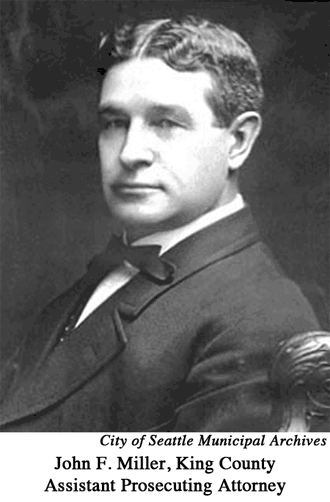 All, that is, but by King County’s prosecuting and assistant
prosecuting attorneys, Kenneth Mackintosh and . “It
seems strange that if public opinion in Oregon is in the mood it is represented
to be,” Miller said, “that these people could not have done their killing down
there without picking one of the most prominent corners in Seattle as the
wash-line for their dirty linen.”
All, that is, but by King County’s prosecuting and assistant
prosecuting attorneys, Kenneth Mackintosh and . “It
seems strange that if public opinion in Oregon is in the mood it is represented
to be,” Miller said, “that these people could not have done their killing down
there without picking one of the most prominent corners in Seattle as the
wash-line for their dirty linen.”
“The killing of Creffield by George Mitchell was the most cold-blooded case of murder in the first-degree that has occurred since I have occupied this office,” Mackintosh said. “I will prosecute him, and believe he will be convicted. The popular opinion which opposes the enforcement of the law will not be considered. I see no reason why Mitchell should not be hanged. . . . I fail to see why the people of this county should not support their officers in the enforcement of the law.”
Poor Miller and Mackintosh. They were about to become almost as reviled as Creffield for simply doing their sworn duties as officers of the court. They got an indication of what lay ahead of them when Multnomah County’s district attorney in Portland, John Manning, sent them a letter offering his assistance, an offer Mackintosh described as “the most remarkable thing I ever heard of.”
Dear Sir:
I notice by the press that there was a man killed in your city the other day by name, Creffield, of religion, Holy Roller, so I hasten to say to you that I have had a great deal to do with this man Creffield, in his lifetime, and the outrageous crimes committed by this brute, in this state, on simple-minded girls and women were many. I had him arrested for the crime of adultery, committed with Mrs. Starr, sister of George Mitchell, the man who killed him. He was convicted, sentenced, and served a term of two years in the penitentiary at Salem, Or.
Creffield broke up many families in Oregon by leading them astray on his fake religion. I investigated many, many charges against him while he was on his Holy Rolling tour in Oregon, the character of which were perfectly awful, in so far as being low, degenerate and brutal, and if permitted, I would like an opportunity to testify before the grand jury, before Mitchell is indicted, or the trial court, as to the low degenerate character of this man, and the outrages and brutalities practiced by him, in Oregon, upon ignorant and unsophisticated girls.
Our officers chased this man all over the state of Oregon, and finally found him hidden under the floor of a house at Corvallis, Or., he having ruined the family and broken up the home.
Now, Mr. Mackintosh, I do not want you to understand that I would not uphold the majesty of law, but when a man infringes upon the common decency of society to the extent that this man did, and there is no statute under which he could be prosecuted, and he has so grossly debauched families, I think the taking of the law in one’s own hands, under such circumstances, to mete out summary justice is almost excusable.
Yours very truly,
John Manning
Mackintosh was appalled. I think the taking of the law in one’s own hands, under such circumstances, to mete out summary justice is almost excusable? This from Multnomah County’s district attorney! Was everyone in Oregon crazy? Even the prosecutors?
“I shall answer the letter as civilly as I can under the circumstances,” Mackintosh said, “but I consider it the most remarkable thing I ever heard of, that a man whose duty it is to prosecute criminals should offer such advice as is contained in his letter.”
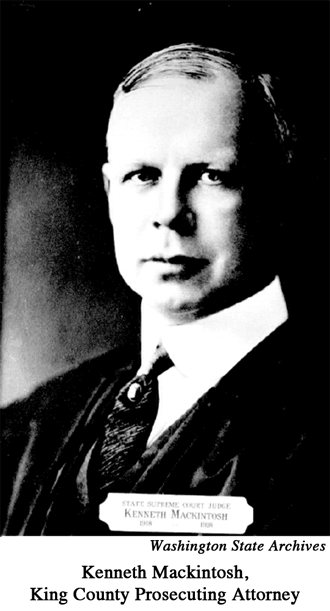 Mackintosh answered Manning:
Mackintosh answered Manning:
Dear Sir:
I am in receipt of your letter of May 8 in regard to the case of State of Washington vs. George Mitchell. . . . As your testimony in the trial of the case in Superior Court would be inadmissible, being merely of a hearsay nature . . . your suggestion is . . . impracticable. . . . I wish nevertheless to thank you for the interest you have manifested in the matter and for your offer of assistance.
As citizens of this country, you and I realize that the enforcement of our criminal laws is entrusted to our courts, juries and public officers, and that lynch and mob law and anarchy are the natural and only results of the efforts of individuals to personally avenge real or fancied injuries. There is no security to life or property if the individual can act as attorney, judge, and jury, and take the execution, not of the law, but of his passions, into his own hands and kill anyone who he may determine has wronged either himself or his family, and this, whether his determination is the product of a sane or demented mind, and whether his wrongs are real or merely delusions.
As officers of the law, sworn to prosecute crime, you and I realize that it is our duty where we are satisfied that a crime has been committed and that there is sufficient evidence to prove the act, to honestly and vigorously prosecute the offender, and that the moral well-being of the community which we represent is vitally affected by the vigor or laxity with which these efforts to enforce the criminal laws are made.
The defendant Mitchell, with deliberate and premeditated malice, shot Edmund Creffield in the back and the laws of this state constitute that act murder in the first-degree, and do not accept as a justification for it the facts and circumstances which Mitchell and his friends allege up to the shooting, even if such facts and circumstances are true as reported by those people. Being sure that this act was done, and that the witnesses to it are available, it became my duty to file an information charging Mitchell with murder, and this I have done; and it will become my further duty to prosecute the defendant fearlessly and vigorously, which I shall do. I cannot and will not presume that a jury of twelve men of the citizens of this county will do other than observe honestly the oaths which they take when they are sworn to try the case, and, observing these oaths, return a verdict in accordance with the law and the evidence, which in this case should mean a verdict of conviction. . . .
Thanking you again for your kind offer in this case, I remain, yours truly,
Kenneth Mackintosh
In the five days before young Mitchell was brought in to court for arraignment, over $30,000 in securities had been offered for his bail. Bail, if granted, was expected to be set at between $5,000 and $20,000. One man, someone George had never met, offered to mortgage his house if it would help--although the typical contribution was one dollar, all that most could afford.
None of this mattered to Prosecuting Attorney Mackintosh. He rose before Judge Archibald Wanless Frater and said bail should be denied because of a statute: “All accused criminals shall be bailable except in a capital crime where the proof is evident and presumption of guilt is great.” He maintained that since the defendant didn't deny killing Creffield, this wasn't a bailable offense and urged the court to disregard all sentiment in the case.
George’s attorney, Morris, admitted that if one wanted to get technical, yes, the statute applied to his client “so far as proof or presumption was concerned.” However:
We have in addition [he said] a divine law and a human law which admits beyond all cavil the right of a man to protect the honor of his family. This boy who had seen his sisters debauched by the man whom he killed and driven frantic with the knowledge that the influence this man exercised over them had led one of the women who is dear to him to desert her husband and children, acted in the full knowledge that unless he acted as he did there was no salvation for the misguided woman.
I appeal to you as a judge and as a man, I ask you if the slaying of a human leper, killed as you would kill a dog, is a deed to make this man a criminal, to make a desperate murderer, a man too dangerous to be at liberty in this community on bail. Can you call this boy, but 23 years of age, a criminal when he, a green country youth, has arisen in his manhood and taken the vengeance of nature upon the lustful viper who had stolen the honor of his sisters.
Archibald Frater was a judge in Washington, which, for the moment, wasn't like Oregon, where, according to some hard-nosed prosecutors, “lynch and mob law and anarchy” ruled. Accordingly, Judge Frater responded to Morris’s appeal: “The law seems clear and is not questioned even by the attorneys for the defendant and there is nothing to do but refuse the motion for bail.”
“Mitchell will know he has been tried, at least, when he gets through with this,” said Assistant Prosecuting Attorney John F. Miller.
***
Thou shalt not kill.
Exodus 20:13.
![]() Chapter 14: Men are Gunning for Creffield
Chapter 14: Men are Gunning for Creffield
***
Some of the newspaper articles that are sources for this chapter:
May 1906: Creffield is Murdered, Murderer is Considered a Hero
***
Chapters from
Holy Rollers: Murder & Madness in Oregon's Love Cult
Part 1: The Seduction
Chapter 1: Trust Me, Brothers And Sisters
(Life Before Creffield [B.C.])
Chapter 2: God, Save Us From Compromising Preachers
(Creffield's Preachings)
Chapter 3: The Flock
(Profiles of the Holy Rollers Were)
Chapter 4: The Holy Rollers
(Things Start to Get Wild on on Kiger Island)
Chapter 5: Housecleaning
(There's a Sacrificial Bonfire)
Chapter 6: Community Concerns
(Officers Visit)
Chapter 7: Esther, The Chosen One
(Creffield Plans to Marry 16-Year- Old)
Chapter 8: Tar and Feathers
(The Men of Corvallis Act)
Chapter 9: Sane People Don’t Go Bareheaded
(Holy Rollers are Committed to the Asylum)
Chapter 10: More Beast Than Man
( Creffield is Arrested)
Chapter 11: God Will Plead Creffield's Case
(Creffield in Court)
Chapter 12: Scandal
(Shocking Testimony at the Trial)
Chapter 13: Calm Before the Storm
(The Holy Rollers Resume their Lives)
Chapter 14: Giving Up The Ghost
(Men are Gunning for Creffield)
Part Two: The People V. Creffield
Chapter 16: The Widow Creffield
Chapter 19: An Inherited Streak of Insanity
Part Three: The Madness
Chapter 23: Seeking Reconciliation
Chapter 24: Another Holy Roller Page One Murder
Chapter 25: What Can Papa Do For You?
Chapter 26: Human Life is Too Cheap In This Community
Chapter 30: The Final Chapter
(What Happened to Everyone Afterwards)
The Epilogue
(Heaven's Gate)
Newspaper Articles about Creffield & the Holy Rollers
1897-1903: B.C. (Before Creffield)
October to December 1903:Holy Rollers Burn Furniture & Pets
January to March, 1904: Holy Rollers Tarred and Feathered
April to June 1904: Holy Rollers are Committed to the Asylum
July 1904: Creffield is Found & Arrested
September 1904: Creffield's Trial
April 1906: Men are Gunning For Creffield
May 1906: Creffield is Murdered, Murderer is Considered a Hero
May 1906: Holy Rollers Found Starving Near Heceta Head
June 1906: George Mitchell's Trial Begins
July 1906: Hurt Testifies of Debauched Wife and Debased Sisters
July 1906: Esther Mitchell Kills Her Brother
August to October 1906: Seattle Prepares for another Big Trial
November 1906: Maud Hurt Creffield Commits Suicide
April 1909-August 1914: Esther Leaves the Asylum
1953 Stewart Holbrook's Murder Without Tears
1951Startling Detective Magazine, Nemesis of the Nudist High Priest
***
